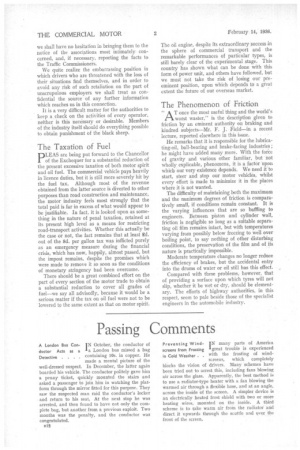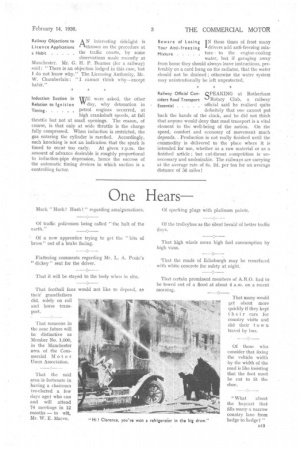Passing Comments A London Bus ConIN October, the conductor of ductor Acts as a la London bus missed a bag
Page 22

Page 23

If you've noticed an error in this article please click here to report it so we can fix it.
Detective . . . containing 10s. in copper. He made a mental picture of the well-dressed suspect. In December, the latter again boarded his vehicle. The conductor politely gave him a penny ticket, quickly mounted the stairs and asked a passenger to join him in watching the platform through the mirror fitted for this purpose. They saw the suspected man raid the conductor's locker and return to his seat. At the next stop he was arrested, and then found to have not only the complete bag, but another from a previous exploit. Two months was the penalty, and the conductor was congratulated.
Preventing WindIN many parts of America screens from Frosting great trouble is experienced in Cold Weather . . with the frosting of wind
screens, which completely blocks the vision of drivers. Many schemes have been tried out to arrest this, including fans blowing air across the glass. Apparently, the best method is to use a radiator-type heater with a fan blowing the warmed air through a flexible hose, and at an angle, across the inside of the screen. A simpler device is an electrically heated frost shield with two or more heating wires, mounted on the inside. A third scheme is to take warm air from the radiator and direct it upwards through the scuttle and over the front of the screen.
Railway Objections to A N interesting sidelight is Licence Applications (-I-thrown on the procedure at
a Habit the traffic courts, by some
observations made recently at Manchester. Mr. G. H, P. Beames (for a railway) said : " There is an objection lodged in this case, but I do not know why." The Licensing Authority, Mr. W. Chamberlain : "I cannot think why—except habit."
WE were asked, the other YV day, why detonation in petrol engines occurred, at high crankshaft speeds, at full throttle but not at small openings. The reason, of course, is that only at wide throttle is the charge fully compressed. When induction is restricted, the gas entering the cylinder is rarefied. Accordingly, such knocking is not an indication that the spark is
timed to occur too early. At given r.p.m. the amount of advance desirable is roughly proportional to induction-pipe depression, hence the success of the automatic timing devices in which suction is a controlling factor, Induction Suction in Relation to Ignition
Timing . . . . . Beware of Losing IN these times of frost many Your Anti-freezing I drivers add anti-freezing mix Mixture ture . to the engine-cooling
water, but if garaging away from home they should always leave instructions, preferably on a card hung on the radiator, 'that the water should not be drained ; otherwise the water system may unintentionally be left unprotected.
SPEAKING at Rotherham Rotary Club, a railway official said he realized quite
definitely that one cannot put back the hands of the clock, and he did not think that anyone would deny that road transport is a vital element in the well-being of the nation. On the speed, comfort and economy of movement much depends. Production is not really finished until the commodity is delivered to the place where it is intended for use, whether as a raw material or as a finished article ; but cut-throat competition is unnecessary and undesirable. The railways are carrying at the average rate of 6s. 2d. per ton for an average distance of 56 miles !
Railway Official Considers Road Transport
Essential




















































































